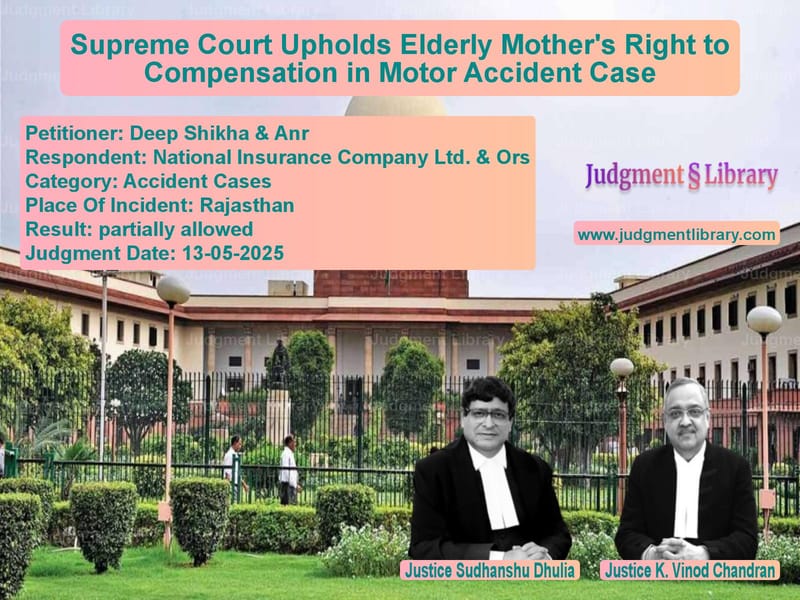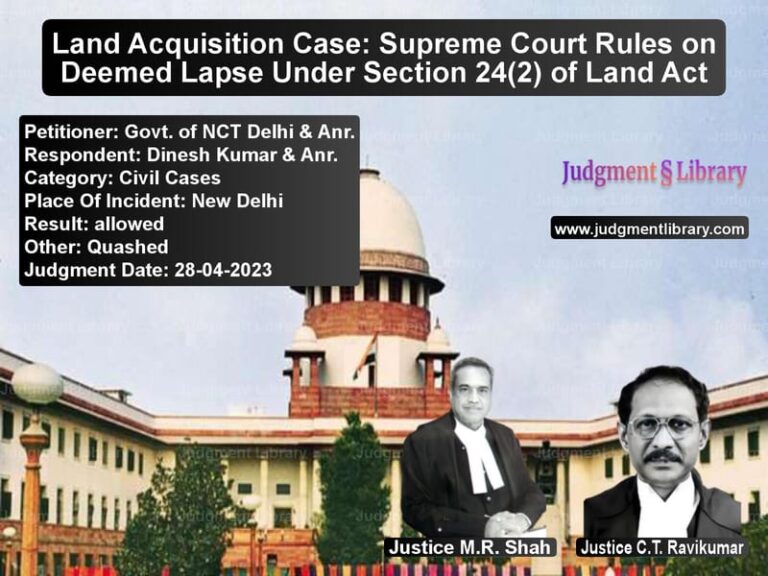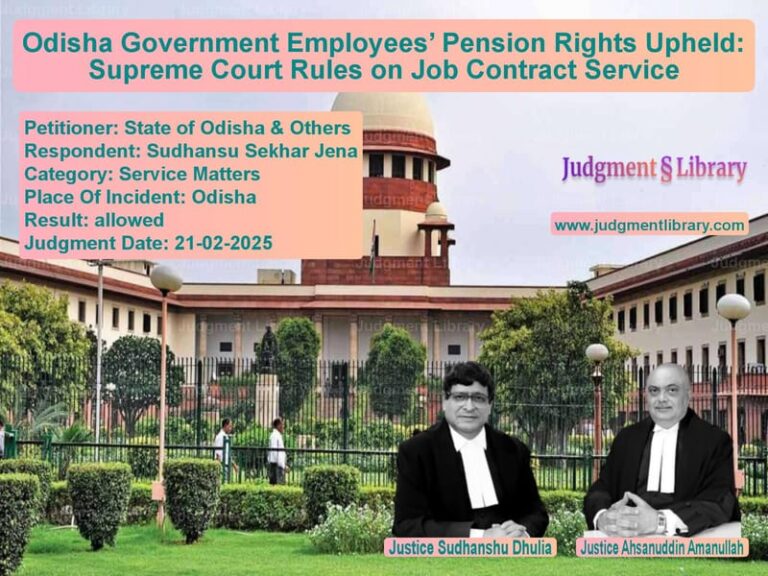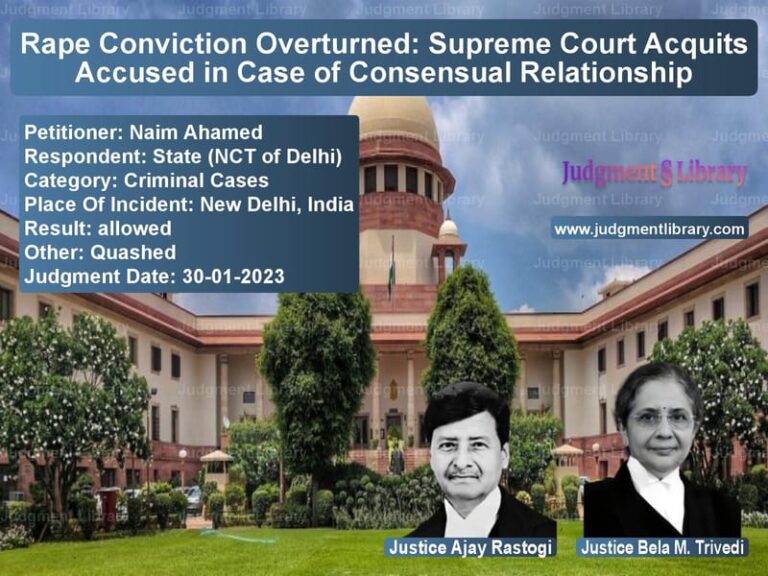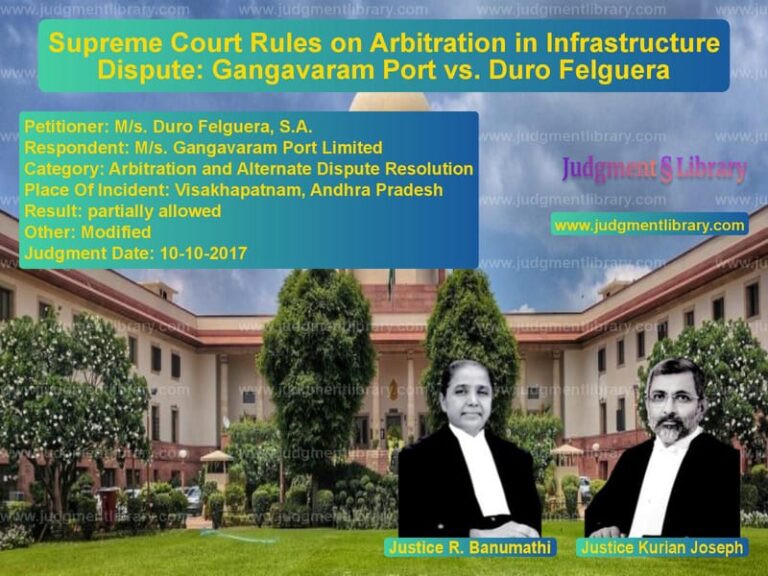Supreme Court Upholds Elderly Mother’s Right to Compensation in Motor Accident Case
In a significant judgment that clarifies the rights of elderly parents in motor accident compensation cases, the Supreme Court of India delivered a landmark verdict on May 13, 2025, reinstating and enhancing compensation for a 70-year-old mother who lost her daughter in a tragic road accident. The case of Deep Shikha & Anr versus National Insurance Company Ltd. & Ors brought to light important questions about dependency, legal heirship, and the obligations of children toward their aging parents.
The heartbreaking incident that led to this legal battle occurred on January 26, 2008, at around 1:15 pm. Paras Sharma was riding her two-wheeler when she reached a road crossing where a Roadways bus stopped to her left. The bus suddenly took a right turn, causing the deceased to come under the rear right-side tyre of the vehicle. She succumbed to her injuries, leaving behind her married daughter, Deep Shikha (Appellant No. 1), and her elderly mother, the second appellant (Appellant No. 2).
The legal journey began when the appellants filed a claim petition seeking compensation of Rs. 54,30,740. The Motor Accident Claims Tribunal, in its order dated May 11, 2011, allowed the claim to the extent of Rs. 15,97,000 with 6% interest from the date of filing the claim petition. The Tribunal assessed the age of the deceased to be between 50 and 55 years and determined her monthly income to be Rs. 24,406. It held that the appellants were the legal heirs of the deceased and were to some extent dependent on her, presuming 50% dependency. Applying a multiplier of 11, the Tribunal computed the loss of income at Rs. 15,84,000. Additional amounts were awarded for loss of love and affection, loss of care and services, and funeral expenses.
Both the claimants and the insurance company preferred separate appeals before the Rajasthan High Court. The claimants sought enhancement of compensation, while the insurance company challenged the award to the married daughter and completely disputed the mother’s claim to compensation. The insurance company argued that the married daughter was entitled to lesser compensation in light of Section 140 of the Motor Vehicles Act, 1988, and that the mother could not be considered a legal heir of the deceased.
The High Court, in its impugned judgment, dismissed the appeal filed by the claimant-appellants and partly allowed the appeal filed by the insurance company. The High Court reduced the compensation awarded to the married daughter to Rs. 50,000 and set aside the award concerning the mother, holding that they could not be considered as dependents of the deceased for the purpose of calculating compensation. The High Court relied on the Supreme Court’s judgment in Manjuri Bera & Anr. vs. Oriental Insurance Co. Ltd. & Anr, holding that only the married daughter was entitled to receive compensation as admissible under Section 140 of the Motor Vehicles Act, 1988.
When the matter reached the Supreme Court, the appellants challenged the High Court’s order on the grounds that it had misinterpreted the Manjuri Bera judgment. The Supreme Court bench comprising Justice Sudhanshu Dhulia and Justice K. Vinod Chandran heard all parties and perused the material on record.
The insurance company’s primary argument was that the married daughter could not be considered dependent on her mother after marriage. They contended that once a daughter is married, the logical presumption is that she now has rights in her matrimonial household and is financially supported by her husband or his family, unless proven otherwise. They argued that it was more than likely that her dependence on her natal family, including her mother, had ceased.
The Supreme Court addressed this argument directly, stating: “Sections 166 and 168 of the Motor Vehicles Act, 1988 focus on the financial relationship between the deceased and the Claimant. A married daughter may be considered a legal representative, as per Manjuri Bera, but she will not be eligible for loss of dependency compensation unless it is proven by the daughter that she was financially dependent on the deceased.” The Court found that Appellant No. 1 had failed to prove that she was being financially supported by her mother post-marriage and hence could not be said to be a dependent of her mother, the deceased. Therefore, the Court upheld the High Court’s decision regarding the married daughter, finding no reason to interfere with the relief granted in her favor.
However, the Supreme Court took a completely different view regarding the elderly mother’s claim. The Court strongly disagreed with the High Court’s decision to set aside the Tribunal’s award concerning Appellant No. 2, the mother of the deceased. The Court noted that Appellant No. 2 was aged about 70 years at the time of the accident and was solely dependent on the deceased as she lived with her and had no independent income. There was no evidence on record to rebut this fact.
In what became the most significant part of the judgment, the Supreme Court made a powerful observation about the obligations between parents and children: “The obligation of a child to maintain their parent in old age is as much of a duty as the obligation of a parent to maintain their child during minority. The deceased, being the only provider, would be assumed to be fulfilling this obligation, further reinforcing Appellant No. 2’s status as a dependent.”
The Court further elaborated on the concept of potential future dependency, stating: “Therefore, the untimely demise of the deceased may create difficulties for Appellant No. 2 going forward, resulting in hardship. Even if it is assumed that Appellant No. 2 was not dependent on the deceased at the time of the accident, the possibility of future dependency cannot be disregarded.”
The Supreme Court distinguished the mother’s case from that of the married daughter, noting that the judgment in Manjuri Bera dealt specifically with the grant of compensation to a legal representative in cases where there was no dependency on the deceased. The Court held that this decision was not applicable to Appellant No. 2 for the reasons set out in their judgment.
In recalculating the compensation, the Supreme Court applied the principles laid down in National Insurance Company Limited vs. Pranay Sethi and Sarla Verma (Smt.) and Ors. vs. Delhi Transport Corporation and Anr., considering factors such as loss of future income, loss of estate, funeral expenses, and loss of consortium. The Court specifically recognized “loss of filial consortium” as a valid head of compensation, awarding Rs. 40,000 under this category.
The Court’s detailed calculation considered the deceased’s monthly income of Rs. 24,406, added 15% for future prospects, deducted 50% for personal and living expenses, and applied a multiplier of 11 based on the age group of 51-55 years. The total compensation awarded to Appellant No. 2 amounted to Rs. 19,22,356, significantly higher than the original Tribunal award.
This judgment sets an important precedent in motor accident compensation law, particularly concerning the rights of elderly parents. The Supreme Court’s recognition of “filial consortium” as a compensable head acknowledges the emotional and practical support that children provide to their aging parents. The judgment reinforces the concept that dependency is not limited to current financial support but includes the legitimate expectation of future care and maintenance.
The Court’s strong stance on children’s obligation to maintain their parents in old age aligns with various personal laws and statutory provisions in India that recognize this duty. By distinguishing between the claims of a married daughter and an elderly mother, the Court has provided much-needed clarity on how dependency should be assessed in compensation cases.
This judgment will likely have far-reaching implications for future motor accident claims involving elderly dependents. It sends a clear message that courts must consider the unique circumstances of each case rather than applying blanket rules about dependency. The recognition that future dependency possibilities cannot be disregarded ensures that vulnerable elderly claimants are not denied compensation based on technical interpretations of current dependency.
The Supreme Court’s careful balancing of the different claims in this case demonstrates a nuanced understanding of family relationships and responsibilities in contemporary Indian society. While respecting the precedent set in Manjuri Bera regarding married daughters, the Court expanded the protection available to elderly parents who lose their means of support due to tragic accidents.
This judgment represents a significant step forward in ensuring that compensation laws remain responsive to the changing dynamics of Indian families and continue to provide meaningful relief to those who suffer genuine loss due to motor accidents.
Petitioner Name: Deep Shikha & Anr.Respondent Name: National Insurance Company Ltd. & Ors.Judgment By: Justice Sudhanshu Dhulia, Justice K. Vinod Chandran.Place Of Incident: Rajasthan.Judgment Date: 13-05-2025.Result: partially allowed.
Don’t miss out on the full details! Download the complete judgment in PDF format below and gain valuable insights instantly!
Download Judgment: deep-shikha-&-anr-vs-national-insurance-c-supreme-court-of-india-judgment-dated-13-05-2025.pdf
Directly Download Judgment: Directly download this Judgment
See all petitions in Road Accident Cases
See all petitions in Compensation Disputes
See all petitions in Motor Vehicle Act
See all petitions in Negligence Claims
See all petitions in Insurance Settlements
See all petitions in Judgment by Sudhanshu Dhulia
See all petitions in Judgment by K. Vinod Chandran
See all petitions in partially allowed
See all petitions in supreme court of India judgments May 2025
See all petitions in 2025 judgments
See all posts in Accident Cases Category
See all allowed petitions in Accident Cases Category
See all Dismissed petitions in Accident Cases Category
See all partially allowed petitions in Accident Cases Category

